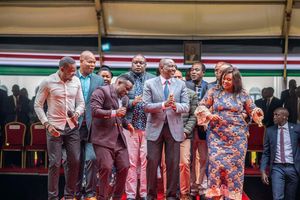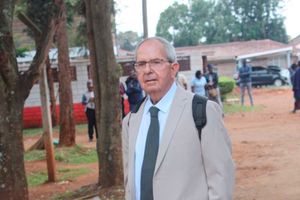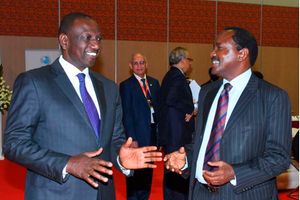Premium
Should I declare myself a widow? Mombasa woman asks govt
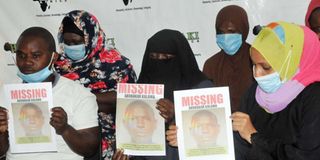
Haki Africa deputy executive director Ms.Salma Hemed [r] joins family members of Mr.Abubakar Kalama [pictured] who was said to have been arrested by police in Mtongwe three days ago and his where abouts remain unknown in this picture taken on 15 August 2020.The relatives who were in the house when he was being arrested alleges that the operation to arrest Mr.Kalama was led by a european man who was accompanied with with Kenya police.
What you need to know:
- On February 2, 2014, her husband Hemed Salim Hemed was arrested at the Musa Mosque in Mombasa.
- Haki Africa is providing psychosocial support to the affected families
Ms Sada Suleiman wonders whether she should declare herself a widow.
On February 2, 2014, her husband Hemed Salim Hemed was arrested at the Musa Mosque in Mombasa.
“Until now, we do not know his fate since he was taken by police officers. We remain hopeful that someday he will come back and we will reunite. The government should come clean and tell us where he is,” she said.
She is among families whose relatives went missing more than six years ago, and who are now seeking information from the government concerning the fate of their loved ones.
The families, who spoke last Sunday when the world marked the International Day of the Victims of Enforced Disappearances, now want the government to say whether their relatives are dead or alive so that they can move on.
Ms Suleiman’s family said life has been hard because Hemed was the breadwinner.
“In every family, there is one whom everyone depends on. In the past six years, we have struggled. The children were young but now they are older and still don’t know what happened to their father,” said Ms Suleiman.
The newly appointed Coast Regional police boss Gabriel Musau, when contacted, however, declined to comment on the matter of missing kin in the region.
“I don’t think I can comment on a matter that I do not know. I cannot comment on something I’m not aware of, please,” Mr Musau said on phone.
The forced disappearances continue to date. A week ago, imams Khalid Salah, Juma Shamte and Hassan Ouma from Markaz Noor madrassa at Mtandoni, Kilifi, went missing.
Three days before that, 25-year-old Abubakar Kalama, a welder from Mtongwe in Mombasa is said to have been abducted by people who identified themselves as police.

His brother Hassan Ibrahim said he was saddened by the disappearance of his brother.
“He is just 25 years. I have searched for him all over, from the police stations, mortuaries and markets, in vain. He is innocent and if there is a claim of any wrongdoing we need to be told. We would like the government to give us answers to this,” said Mr Ibrahim.
Whereabouts of their relatives
Haki Africa Executive Director Hussein Khalid noted that it was hard for the families not knowing the whereabouts of their relatives.
“Many of the married women whose husbands have disappeared hold on to the hope of a reunion. Some who have stayed for long want to remarry but are tied down by the commitment they made to their now missing husbands. They are not sure whether they are wives or widows. There are children, you may want to move on but you wonder … what if your husband returns,” said Mr Khalid.
Haki Africa is providing psychosocial support to the affected families
Mr Khalid claimed the organisation received reports of at least 12 people each month who have gone missing since January.
“We are doing what we can to pursue justice through the courts but there seem to be no fruits. On the Hemed case, we are still waiting for a public inquiry,” he added.
The situation is no different in the neighbouring Kwale County, where several civil society groups under the aegis of the Kwale Civilian Oversight Forum are also calling on the government to set up a judicial commission of inquiry to investigate and bring to justice all those suspected of criminal responsibility in the forced disappearances.
The civilian-led forum has documented 28 cases of extra-judicial killings and forced disappearances that occurred in 2019 up to February 2020 in Kwale.
While presenting a memorandum of complaints to the office of the Sub-County Police Commander in Msambweni on Sunday after leading a peaceful procession to mark International Day of Victims of Enforced Disappearances, the rights groups called on the government to investigate the cases and hold accountable the officers involved in the killings.
Mr George Jaramba, the coordinator of Kwale Human Rights Network, said many of the forced disappearances have taken place in the context of operations against suspected members or sympathisers of the Somalia-based Islamist militant group, Al-Shabaab.
“Forced disappearances have become a widespread practice and a dark stain on the fabric of law enforcement in Kenya that can only be sustainably addressed by bringing to account those suspected of responsibility through fair trials,” he said.
Of the 28 missing, the bodies of Juma Said Sarai, Khalfan Linuku Abdalla, Nassir Gatana -- who disappeared on December 22, 2019, and Usama Nassir, who disappeared on November 30, were recovered at Tsavo National Park in Taita-Taveta County, between January 14 and 20 this year.
The four were picked up from Kwale County last year by officers who claimed to be attached to the Anti-Terror Police Unit.
Subsequent deaths
Those who disappeared in January this year include Abdalla Bungale, 25, a father of three and Mama Fatuma, 52, a single mother of seven.
"We want an independent probe into the listed incidents of forced disappearances and recommend that a public inquest be conducted to get to the bottom of these disappearances and the subsequent deaths in the Coast region," said Mr Jaramba.
The civilian forum also wants the government to compensate the families of the victims of forced disappearances as a way of sustaining the widows and orphans left behind.
Kashi Jermaine of Human Rights Development Agenda (Huda) said he had recorded 62 widows and at least 300 orphans from the families of the victims of enforced disappearances in Kwale.
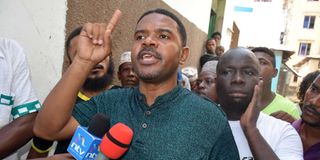
Mr Jermaine said communities are directly affected by the disappearance of breadwinners, and the degradation of the families' economic situation and their social marginalisation.
"The serious economic hardships which usually accompany a disappearance are most often borne by women, and it is women who are most often at the forefront of the struggle to resolve the disappearance of family members," he said.
The rights groups also called on the public prosecutor to the arrest and charge security officers who were involved in a security operation in Kibundani village, Ukunda, that left Ramadhan Chitswa (42), his two children Rama Chitswa, 8, Shwalha Chitswa, 4 and and his unborn baby dead.




